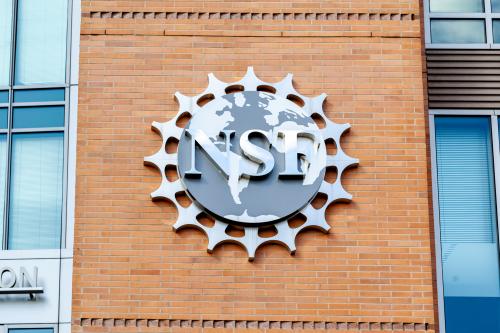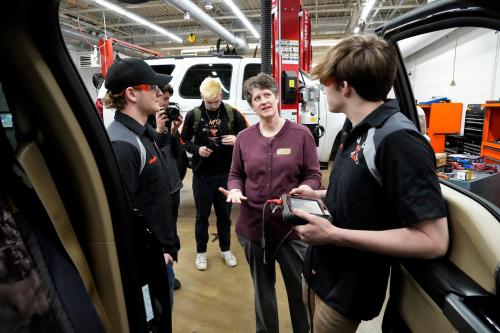Later this summer, 20 of San Diego’s innovative tech startups will gather for an event with all the trappings of a Silicon Valley-style tech extravaganza, including virtual reality headsets and drones. But instead of taking place at a downtown incubator or the University of California-San Diego’s oceanside campus, the gathering will occur at the Jacobs Center for Neighborhood Innovation, located in an area where 24 percent of the population lives below the poverty line.
The event is organized by CONNECT ALL, a new initiative of the region’s prominent CONNECT innovation organization. It’s part of a broader strategy to help more San Diegans access the region’s strong tech and life science sectors, which local leaders say can serve as a “rocket ship” to opportunity given the significant wealth they can create for entrepreneurs with a winning idea. The growth of those sectors has largely bypassed some parts of the region, including the highly diverse Diamond District (home to the Jacobs Center) and other neighborhoods located—in local shorthand—“south of the 8” freeway.
Expanding access to the tech economy is not a challenge unique to San Diego. The under-representation of women and minorities in the tech world has garnered increased attention in recent years, epitomized by high-profile incidents at Uber and a cascade of accounts drawing attention to cultural barriers to diversity. Beyond these headlines, limited access to the capital and networks typically needed to translate a promising idea into a successful business can constitute significant barriers to building a more diverse tech ecosystem. Last year, economists Alex Bell and Raj Chetty found that high-achieving higher income children are significantly more likely to become inventors than their similarly high-achieving but lower income peers. Helping racially and economically diverse populations overcome barriers to the innovation economy becomes an even stronger imperative as historically underrepresented groups compose an increasingly large share of the U.S. labor force.
“We believe that no community has a monopoly on ideas,” said CONNECT ALL’s director, H. Puentes.
CONNECT ALL’s bet is to build a more diverse pipeline of decisionmakers and executives over the long term, who can, in turn, inspire and create more opportunities for diverse entrepreneurs. That starts with raising awareness and building trust in underserved communities—reinforcing the idea that anyone with a smart idea can themselves become an innovator. From there, CONNECT ALL proceeds to more targeted outreach and recruitment aimed at diverse entrepreneurs, working with libraries, community boards, minority chambers, and others. Finally, the initiative connects promising innovators to programming and mentorship. This may seem like starting small—the initiative might identify one aspiring tech innovator for every 40 entrepreneurs leading other neighborhood-based small businesses—but leaders believe they are playing a long term game that starts with changing culture.
“We believe that no community has a monopoly on ideas,” said CONNECT ALL’s director H. Puentes. ”CONNECT ALL is there to bridge the gap between these ideas and the resources needed to turn them into the next iconic companies.”
Organizations in a growing number of cities are experimenting with new ways to better harness diverse entrepreneurial potential. Atlanta’s TechSquare Labs aims to make the region’s entrepreneurial ecosystem more inclusive with a targeted accelerator and seed fund housed near Georgia Tech. The city of Portland’s economic development agency, Prosper Portland, launched an inclusive start up fund that invests in both tech and non-tech businesses and a suite of other minority entrepreneurship support services (That fund is managed by an independent investment fund). In Chicago, the Blackstone Charitable Foundation and economic development organization World Business Chicago recently partnered on a multi-year challenge to invest in organizations and programs that support inclusive entrepreneurship. And the Economy League of Greater Philadelphia has pointed to low participation of diverse groups as a barrier to the region’s tech economy and outlined several strategies to engage these populations.
Notwithstanding these promising efforts, it will take more than one-off initiatives and programs to overcome the economic divides and entrenched cultural barriers to inclusive innovation. Journalist Brentin Mock recently highlighted the challenges and complexities Pittsburgh has faced in trying to build an inclusive tech ecosystem, ranging from ensuring diverse participants in local initiatives become employed in the tech sector, to making sure that they feel welcome at industry events. More broadly, starting a business—and succeeding—is a challenge for all entrepreneurs, even those that don’t face additional barriers. Cities and regions stand to reap great benefits if they are able to open more seats on the innovation rocket ship, but they shouldn’t underestimate the depth of time and commitment it will require.
Brookings, San Diego, and two other regions are engaged in a six-month project exploring the role of economic development in contributing to better outcomes for workers, firms, and communities. The San Diego Regional EDC, the Jacobs Center for Neighborhood Innovation, and the University of California-San Diego are lead partners in the effort. The San Diego Regional EDC is also a member of the Metropolitan Leadership Council, a network of business, civic, and philanthropic leaders that acts as a financial and intellectual partner of the Brookings Metropolitan Policy Program.








Commentary
Trying to create more seats on the innovation rocket ship
July 10, 2017